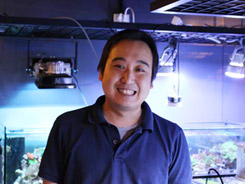
Located in the Izu city of Shizuoka prefecture, bluelab is a company that retails numerous types of natural seawater for different uses that meet the requirement of various species. The property and composition of water may vary depending on its depth, even if it was collected from the same location.
Nazeem 10 is seawater collected near the ocean surface. Taking pride in “fresh live seawater” that is not stored, Nazeem 10 is ideal for fish, sea anemones, and coral.
Nazeem 800 is deep ocean seawater pumped and collected from IzuAkasawa at the depth of 800m below the ocean surface. At this sea level, the average temperature is around 4℃ (39.2℉) and it is rich in nutrients due to the increased water pressure. The ocean water is used to supplement nutrients in a fish tank with soft coral, seaweed, and shellfish such as shrimp. It is used in various settings, including fish market and fish farming.
Buffered (pH 8.3) and non-buffered Nazeem 10 and 800 are available.
Mr. Shimazawa from bluelab has been using an ATAGO's salt meter, ES-421 to monitor the salt concentration in seawater. This time, Mr. Shimazawa tried PAL-Fish Tank, which can measure and display seawater concentration. To our delight, Mr. Shimazawa highly praised PAL-Fish Tank’s ease of use, compactness and the fact measurement results display within 3 seconds with a push of a button.
Did you know that specific gravity changes with water temperature when you are making artificial seawater or changing its concentration? PAL-Fish Tank is equipped with automatic temperature compensation feature. Unlike hydrometer that requires to compensate for the temperature of water, the measurement from PAL-Fish Tank does not have to be compensated.
As a side note, bluelab kindly offered us use of their ocean water when we were developing and testing PAL-Fish Tank. In Tokyo, where our head office is, it was difficult to access clean ocean water. Not only bluelab provided us seawater, they generously offered their expert advice.

Coral Lab is a coral specialty shop located in front of SarueOnshi Park in Koto District of Tokyo. Here, aquarium kit for corals and corals imported from Australia, Indonesia and alike are retailed.
At a glance, the storefront does not look like a shop that is selling corals.
Inside, there are many large fish tanks illuminated with blue-white light that reminds one of the aquariums.
The store manager Mr. Otsuka imports and retails coral. This opportunity came from getting to know the local decorative coral producer through his scuba diving hobby. Coral is an extremely delicate animal. The slightest concentration changes acceptable for saltwater fish may damage, weaken and kill a coral.
At aquariums, saltwater is made using commercially available artificial seawater. The concentration management is extremely important in bringing out its benefit.
Coral Lab always uses the PAL-06S to monitor the seawater that is supplied to all the tanks in the store. When making new seawater,artificial seawater is added to the distilled water that is made by purifying tap water. The concentration is checked whenever the new seater is prepared and taken more than 10 times daily.
Apart from checking the concentration daily, all of the tanks are checked once a week and the measurement value of PAL-06S is cross referenced by MASTER-S/Millα on a monthly basis.
Coral Lab showed us how they measure their tanks.
Coral Lab always recommend customers who are setting up a new tank to purchase seawater salinity meter PAL or MASTER.
The reason for this recommendation is that Mr. Otsuka (store manager) compared and tested various brands of specific gravity meter and Chinese refractometers.
The testing result showed that ATAGO products provided accurate measurements that were not affected by temperature differences. Mr. Otsuka recommends ATAGO product to maintain a healthy marine fish tank environment for living corals.
This is not the only reason why correct salinity concentration is required. Coral Lab recommends adding necessary nutrients based on lab results from a water quality testing company. The test result will not be useful without having an accurate salinity meter. Delicate corals require meticulous care.
Coral Lab has not changed their overflow tank for two years!
Mr. Otsuka has been conveying the importance of salinity management to customers and he feels that this idea is finally starting to take root. We hope that the awareness of aquarium maintenance and propagation of corals in Japan will continue to increase.
Thank you for your continuing patronage and we at ATAGO wish you the best.
Coral Lab's Website
https://coral-lab.com/
Natural Seawater Bluelab’s Website
http://www.bluelab.jp/